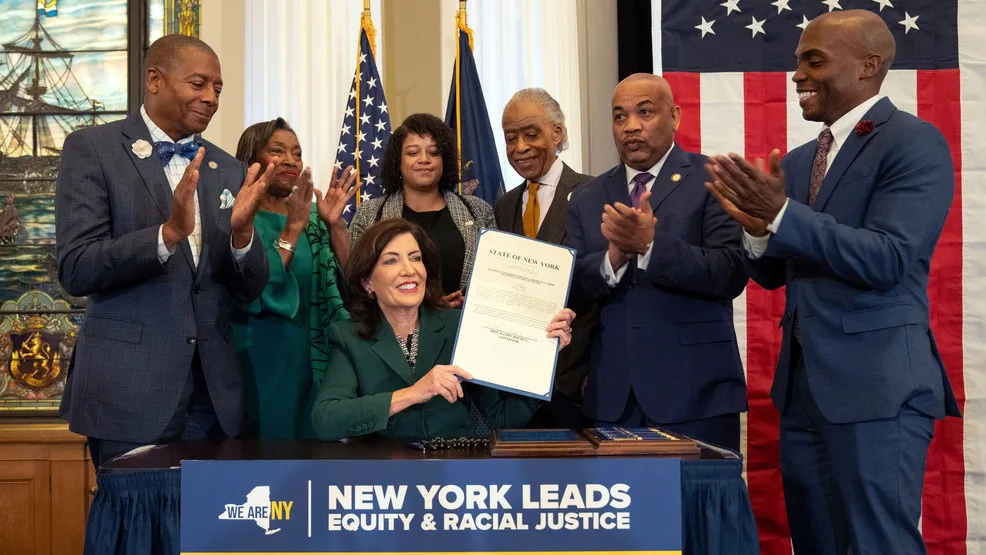
ALBANY, N.Y. (AP) — New York State will create a commission tasked with considering reparations to address the persistent, harmful effects of slavery in the state, under a bill signed into law by Gov. Kathy Hochul on Tuesday.
It comes at a time when many states and towns throughout the United States attempt to figure out how to best reckon with the country’s dark past, and follow in the footsteps of similar task forces established in California and Illinois.
“In New York, we like to think we’re on the right side of this. Slavery was a product of the South, the Confederacy,” Hochul, a Democrat, said at the bill signing ceremony in New York City. “What is hard to embrace is the fact that our state also flourished from that slavery. It’s not a beautiful story, but indeed it is the truth.”
The law, which was passed by state lawmakers in June, says the commission will examine the institution of slavery, which was fully abolished in New York by 1827, and its ongoing impact on Black New Yorkers today.
The battle for civil rights was not below the Mason–Dixon line. The largest port of slave trade was in Charleston, South Carolina and Wall Street, New York,” said the Rev. Al Sharpton, who spoke at the signing ceremony. “So this today starts a process of taking the veil off of northern inequality and saying we must repair the damage and it can be an example for this nation.
The nine-member commission will be required to deliver a report a year after its first meeting. Its recommendations could potentially include monetary compensation but would be non-binding. The panel’s findings are intended to spur policy changes, programs and projects that attempt to remedy slavery’s harmful effects.
The idea of using public money to compensate the descendants of enslaved people is almost certain to draw a backlash from some, including some white people who don’t believe they should have to pay for the sins of long-ago ancestors, and other ethnic groups that weren’t involved in the slave trade.
Sharpton said he expected Hochul to pay a political price for convening the commission.
“I want to give credit to this governor for having the audacity and courage to do what others wouldn’t do. And I know she had to wrestle with it. And I know her political advisors told her it’s too risky,” the famed civil rights activist said. “But she did it because it’s right.”
The governor and the legislative leaders of the state Assembly and Senate will each appoint three qualified members to the commission. They have 90 days to make their picks.
This is not just about who we’re going to write a check to, and what the amount is,” said Democratic Assembly Speaker Carl Heastie, the first Black person to hold the position.
“It begins the conversation with one recognizing the issues that affected Black people and descendants of slaves in this state,” he said.
State Senate Republican Leader Rob Ortt said in a statement that he believes New York’s recommendations will come at an “astronomical cost” to all New Yorkers.
“The reparations of slavery were paid with the blood and lives of hundreds of thousands of Americans who fought to end slavery during the Civil War,” he said. He added that it’s unrealistic for states to meet the potentially expensive price tag that could come with cash reparations.
California in 2020 became the first state to create a reparations task force. The group handed its two-year report to state lawmakers in June, who then introduced a bill that would create an agency to carry out some of the panel’s more than 100 recommendations, including helping families with genealogical research. But turning those proposals into policies could be difficult, given the state is facing a heavy budget deficit.
Other states, including Massachusetts and New Jersey, have considered studying reparations, but none have yet passed legislation. A Chicago suburb in Evanston, Illinois, became the first city to make reparations available to Black residents through a $10 million housing project in 2021.
Cornell William Brooks, a professor at the Harvard Kennedy School who teaches civil rights and researches the economics of reparations, said state-led initiatives similar to New York’s are crucial for reaching national reconciliation and repair.
States and municipalities cannot solve a national problem by themselves, but they can be a means by which we reach a national solution,” he said.
The U.S. Congress apologized to African Americans for slavery in 2009, but a federal proposal to create a commission studying reparations has long stalled.
The legislation establishing the New York commission notes that the first enslaved Africans arrived at the southern tip of Manhattan Island, then a Dutch settlement, around the 1620s and helped build the infrastructure of New York City — “including the wall that gives Wall Street its name.”
New York City Mayor Eric Adams on Tuesday expressed support for the measure, noting that some venerable institutions in New York, as elsewhere, are tied to wealth that derived from exploiting the labor of enslaved people.
“We have to reckon with that,” Adams, a Democrat and former state senator, said during a City Hall news conference.


